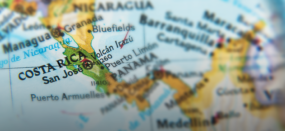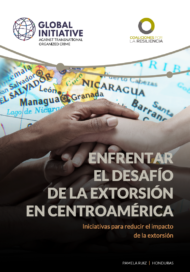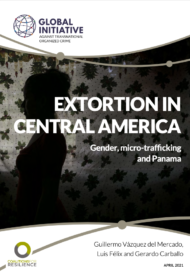Extortion depends on threats of violence and the assumption that the state cannot protect its citizens from those threats. The violence that gangs such as Mara Salvatrucha (MS-13) and Barrio 18 have proven themselves capable of generates fear and hopelessness among the communities in Guatemala, El Salvador and Honduras, where the gangs are behind the extortion economy.
Fear of losing their property, belongings or even their lives – and the lack of trust in state institutions that are mandated to protect them – is what in many cases drives people to migrate within their own countries or abroad in hopes of fleeing the threats and starting anew.
If quantifying the number and type of acts of extortion is a complex task, determining how many people are internally and internationally displaced due to extortion and adverse socio-economic conditions is even more complicated.
These three stories narrated and illustrated by Guatemalan journalists describe the challenges and threats that people face when being extorted by gangs and when interacting with the authorities and with ‘coyotes’ (human smugglers) when they decide to emigrate north.
A new neighbourhood, a new life
Many Guatemalan families that are threatened by gangs leave their homes behind and flee to protect their lives and avoid extortion. This fear created by organized crime leads to forced migration within their own country.

The unstoppable Central American migrants
Whether alone or travelling as part of a caravan, migrants are exposed to a dangerous journey when crossing illegally into the United States. Unable to withstand the situation in Central America any longer, they flee north, while criminal structures modernize and strengthen the migration business.

Covering extortion in Guatemala
Despite the risks faced by journalists who cover extortion issues, they feel it is important to inform the public and delve into the stories of criminals and victims, and the way these organizations work, because extortion is one of the crimes that most affects residents of Guatemala City – one of the areas where communities are most subjected to extortion.

To delve deeper into these stories and the journalists who, in their narratives, identify the challenges and threats suffered by victims of extortion, listen to our latest episode of the Coalitions for Resilience podcast here (content in Spanish).
La extorsión se construye sobre amenazas de violencia y el supuesto de que el Estado no puede proteger a las personas de esas amenazas. La violencia que han demostrado ser capaces de ejercer las pandillas o maras como la Mara Salvatrucha (MS-13) o Barrio18 –las principales organizaciones criminales que promueven la extorsión en Guatemala, El Salvador y Honduras– genera temor y desesperanza en los ciudadanos, que son las principales víctimas.
Es justo el miedo a la pérdida de los bienes, o incluso la vida, y la imposibilidad de recurrir a las instituciones del Estado, lo que en muchos casos lleva a las víctimas a desplazarse a otras zonas de su propio país o del extranjero, con el objetivo de huir de las amenazas y comenzar de nuevo.
Si cuantificar con precisión el número y tipo de extorsiones es una tarea compleja, lo es aun más determinar el número de desplazados (internos e internacionales) por extorsiones y condiciones socioeconómicas adversas. En este sentido, las y los periodistas han sido responsables de visibilizar no solo las extorsiones, sino también las amenazas y retos que deben sortear las personas quienes deciden alejarse de sus lugares de origen para salvaguardar su vida y la de sus familias.
Estas tres historias narradas e ilustradas por periodistas guatemaltecos describen los retos y amenazas que los ciudadanos sufren al ser extorsionados por las maras y al interactuar con autoridades y «coyotes» (traficantes de personas) cuando deciden emigrar al norte.
Cambiar de barrio, cambiar de vida
Muchas familias guatemaltecas que son amenazadas por las pandillas abandonan sus casas y huyen para salvar su vida y no pagar las tasas de extorsión. Este terror que infunde el crimen organizado provoca una migración obligada en su propio país.

Los imparables migrantes centroamericanos
Solos o en caravana, los migrantes no se salvan de la peligrosa travesía de viajar ilegalmente a Estados Unidos. Mientras ellos huyen –hartos de la situación en Centroamérica– las estructuras criminales modernizan y fortalecen el negocio migratorio.

Cubriendo la extorsión en Guatemala
A pesar de los riesgos que viven los periodistas por cubrir estos temas, ellos consideran importante informar y profundizar en las historias de los criminales, de las víctimas y del modus operandi de estas organizaciones, pues la extorsión es uno de los delitos que más afecta a quienes viven en la ciudad, una de las áreas más extorsionadas del país.

Conoce más de estas historias y a los profesionales del periodismo que en sus narraciones logran identificar retos y amenazas que sufren las víctimas de extorsión.
Escucha nuestro episodio Extorsión y periodismo del podcast Coaliciones por la Resiliencia aquí.









